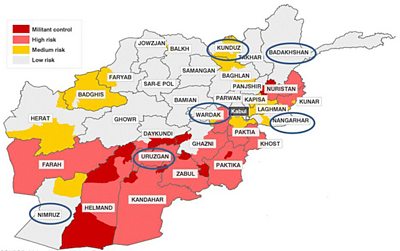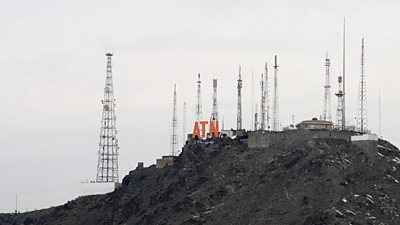Downloads
Publication date: September 2012
Summary
- ����ý Media Action,with funding from the UK's Department for International Development through the Global Grant, is working in Afghanistan to deliver a series of political debate/discussion programmes entitled Open Jirga on television and radio.
- Afghans reported that there have been some significant improvements over the past 10 years, particularly in terms of education, healthcare, construction projects and electricity supply.
- Corruption remains a serious issue within the country. This was an issue expressed by many participants. Fighting corruption is seen as a key priority.
- Afghans reported a preference to refer issues to their traditional elders, rather than to the government. Only if elders pass on an issue will Afghans interact with the government.
Context
The goal of building a modern, stable functioning state in Afghanistan continues to be a key challenge. After almost three decades of war, the country remains a fragile state, experiencing ongoing conflict and political and social challenges. There have, however, been some positive achievements in recent years. Since 2002, the economy has grown by over 10% per year. Just under 2 million girls are now estimated to be receiving an education, compared to virtually none under the Taliban rule, and health care provision has improved for large numbers of the population. In 2010, the Afghan Ministry of Public Health claimed that 90% of the population was within a two-hour walk of Primary Health Care Services, as opposed to 9% in 2000 (Note 1). As the country prepares for the withdrawal of international combat forces, there are concerns about the sustainability of these achievements.
The project
����ý Media Action, with funding from DFID, is working in Afghanistan to deliver a political debate/ discussion programme on television and radio. The programme’s title is Open Jirga (Note 2) and aims to increase accountability between citizens and government. The debates will be produced in partnership between ����ý Media Action and Radio Television Afghanistan (RTA) with national coverage. The debates will also be supported by governance related scenes in the existing radio drama New Home, New Life, as well as radio educational feature programmes, produced by Afghan Education Production Organisation (AEPO). The ����ý Media Action research team conducted formative qualitative research to understand behaviours and attitudes to governance, media and accountability in order to inform and support programme development.

Research methodology
The research consisted of 96 paired depth interviews among men and women aged 18-55 in both urban and rural areas who were both ����ý listeners and non-listeners. Interviews were conducted in the broadcast areas across the Kunduz, Wardak, Uruzgan, Nangarhar, Nimroz and Badakshan provinces. The research sampled the main ethnicities within Afghanistan (Pashtuns and Tajiks) as well as minority groups such as the Baluch and Uzbeks, and covered both Pashtu and Dari speakers.
Findings
The majority of participants reported corruption to be a major issue in Afghanistan. One participant from Uruzgan stated that: 'Official corruption is very strong in Afghanistan, as if it’s an article in the constitution.' Whilst corruption was widely viewed as an issue, people’s reactions to it varied depending upon which province they were from. In the more pro-Government areas (Nangarhar and Kunduz) corruption was viewed with reluctant acceptance, whereas in the areas with an active insurgency (especially Uruzgan but also Wardak) it aroused more hostility.
Ten years after the establishment of democracy in Afghanistan, participants reported they were still reticent to go to their government as they expected to have to bribe officials. Rather, people looked to their traditional tribal or village elders for conflict resolution and the first level of leadership. A participant from Nangarhar commented that: 'If the elders could not solve the conflict issue, government cannot solve the issue.' Only if the elders passed on an issue do Afghans seek a resolution involving the government. Participants felt that elders are more trustworthy than the government, although it is still accepted that in some cases, elders too need to be bribed.
Participants perceived progress had been made over the last ten years. Education was highly valued and was consistently viewed as a positive since the fall of the Taliban regime. Construction, particularly of roads, was frequently cited as having improved. An overall increase in healthcare services was also noted, along with the wider availability of electricity. One participant from Kunduz stated that: “Despite issues, there have come many changes in the last 10 years that can’t be ignored. Girls can go to school and women can work. Private universities, schools, clinics and hospitals are built, roads are paved.”
Implications
Afghans generally have had negative direct experiences with their government, thereby devaluing democracy to many. This raises the issue that simply aiming to improve understanding of the democratic process may not be sufficient to improve public deliberation and interaction between citizens and political leaders, since the democratic process itself holds little currency in the eyes of some of the population. This would seem to be especially true of the people outside of Kabul, particularly in the south and east of the country where the Taliban and other insurgent groups draw their strength. It may be advantageous for the programmes to explore the value of democracy itself before moving onto its checks and balances.
At present, the Afghan population is reluctant to interact with its own government, preferring the traditional leadership of local elders. Therefore, the role of the local elder is an important one for the radio drama. It is also recommended that elders be monitored as a distinct stratum of decision makers within their own communities.
Notes
- Islamic Republic of Afghanistan, Ministry of Public Health, Annual Report 1387.
- Jirga is Pashtu for an assembly, but the word is also regularly used in Dari.
